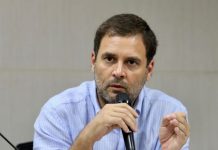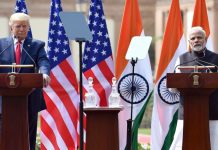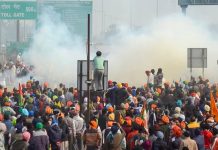
Prime Minister Narendra Modi seems to have a new strategy for BJP in 2019 polls. The party now appears to be concentrating on isolating Congress and Rahul Gandhi from other opposition parties by targeting them individually. The saffron party is apparently working on a plan that would enable it to form a government even if it does not get an absolute majority in the next Lok Sabha elections. This could be done only in a situation where regional parties side with the BJP when it confronts Congress and its allies in post-poll scenario in 2019.
The change, obviously, has come after the party’s failure to install a non-Congress government in Karnataka. The Congress did only successfully block BJP’s way to power in the state, but also effectively generated a hope among regional parties that they could capture power in the Centre if they join hands in opposing Modi and are able to prevent splitting of anti-BJP votes. The BJP is now apprehending potential threat from Rahul Gandhi as far as mobili singof diverse political forces against BJP is concerned. The BJP was expecting a slow and timid response from a Rahul led Congress in Karnataka as had been the case in Goa and Manipur. However, Rahul Gandhi acted with speed and stitched an alliance with the JDS without losing any time. This move changed the scenario at the state as well as at the national level. All the important regional formations came together to celebrate the installation of a non-BJP government. This was meant to send a loud and clear message of Opposition unity.
BJP’s targeting Congress has more than one reasons behind it. It fits into a broad narrative that India has lost almost its six decades under an “inept family rule”. It is easy to hold Congress responsible for all that which India has failed to achieve. It helps Modi build an image of the saviour of the country. His campaign during celebrations on completing his four years of rule testifies the changed strategy of Modi. Addressing a rally at Cuttack in Odisha he alleged that the Congress was pursuing a policy of “family first instead of country first.”
“During UPA regime, the Congress party was running the government through remote control. It only gave the slogan of ‘garibi hatao’ but did not serve the poor. Half of the population does not have gas electricity or road connection,” Modi said.
Modi also accused the Congress of not reali singthat poor are not getting access to banks. “Why didn’t the Congress ever see that the lives of poor people also hold value and they also need life insurance?”
When it came to the poor health infrastructure in Odisha, he refrained from directly accusing the state government which is in power for over one and half decade and held UPA government responsible for it. Modi said, “Situation is worse here in Odisha. I wonder what were the previous governments doing? If the state governments do not carry out their responsibilities properly, the centre does it.”
Odisha Chief Minister has been following a policy of equidistance from both BJP and the Congress. He did not attend the oath-ceremony of HD Kumarswamy, the Karnataka chief minister. The BJP became ambitious in 2016 when it had increased its vote share in panchayat polls. However, it soon realized that this was premature to celebrate the success because the party had to face a drubbing in an assembly poll which was held soon after the panchayat polls.
In another public meeting in Uttar Pradesh, he targeted the Nehru-Gandhi family. This seems to be a part of the fresh campaign the Sangh Parivar has launched against the first prime minister of India, Jawaharlal Nehru. The same old allegations of purported disrespect to Sardar Patel and Subhash Bose are being made.
However, it is yet to be seen that how far personal attacks help BJP in getting votes to win the battle. The weapon has been used more than once. At least, the poll results in Gujarat and Karnataka showed that these attacks only marginally affected the polls. True, Rahul could not defeat Modi-Shah combine, he certainly performed well in both the states and saved his party from humiliating defeats. The party increased its percentage of votes.
In addition to attacking the Congress, Modi-Shah is trying to find regional allies to force Congress to go to the polls without allies. However, the party is hardly finding it easy. Most of the dominant regional parties have by now gone away from it. Even in the states where the Congress is better placed and in a direct fight with the regional forces, the BJP is being considered the real threat. In these states, regional parties are not averse to some kind of arrangement with the Congress. Here, they do not find any scope of joining hands with the BJP. They consider BJP as their main enemy.
The BJP is finding it difficult to retain existing allies as well. If TDP has left National Democratic Alliance, its other allies are also showing uneasiness. Its pre-poll allies in Bihar, Lok Janshakti Party of Ramvilas Paswan and Rashtriya Lok Samata Party of Upendra Kushwaha are exhibiting discomposure. The post-poll alliance with JDU is also showing strains. Bihar Chief Minister Nitish Kumar has started attacking the partner. Once a supporter of demonetization, Kumar has turned out to be a critique of it. He is also unhappy with the amount sanctioned for the flood relief. The Chief Minister has indicated that he might agitate for Special Status for the state.
The tension has been brewing in Uttar Pradesh as well. Smaller parties like Apna Dal are also not happy. They are asking for more seats to contest and BJP is in no mood to oblige them. The BJP is also trying to bypass these parties by directly addressing the social segments they are representing. There is a talk of change in the reservation formula to provide separate reservation to other backward classes under the quota for backward classes. The party had won a huge number of seats with the help of other backward classes in 2014 and if it is able to change the formula it can hope to repeat the same without smaller parties.
On the other hand, Congress has been winning allies. The regional parties are too joining hands with each other. Till recently, the SP-BSP alliance was considered to be the most difficult, but it has not only become a reality but also proved to be effective after it won the Lok Sabha by-polls of Gorakhpur and Phulpur in Uttar Pradesh.
If Congress’ open arm policy is giving sleepless nights to BJP leaders, the attack from opposition on issues like unemployment, price rise, high price of petrol and diesel is also causing discomfort to the ruling party.
“The ruling party before coming to power made big promises such as employment to 2 crore youth every year, remunerative prices to the farmers, bringing back black money stashed abroad, eradication of corruption so on and so forth. There were 42 big promises made but none of the promises has been fulfilled,” said senior leader Sharad Yadav who has just launched a new political party-Loktantrik Janata Dal.
letters@tehelka.com













